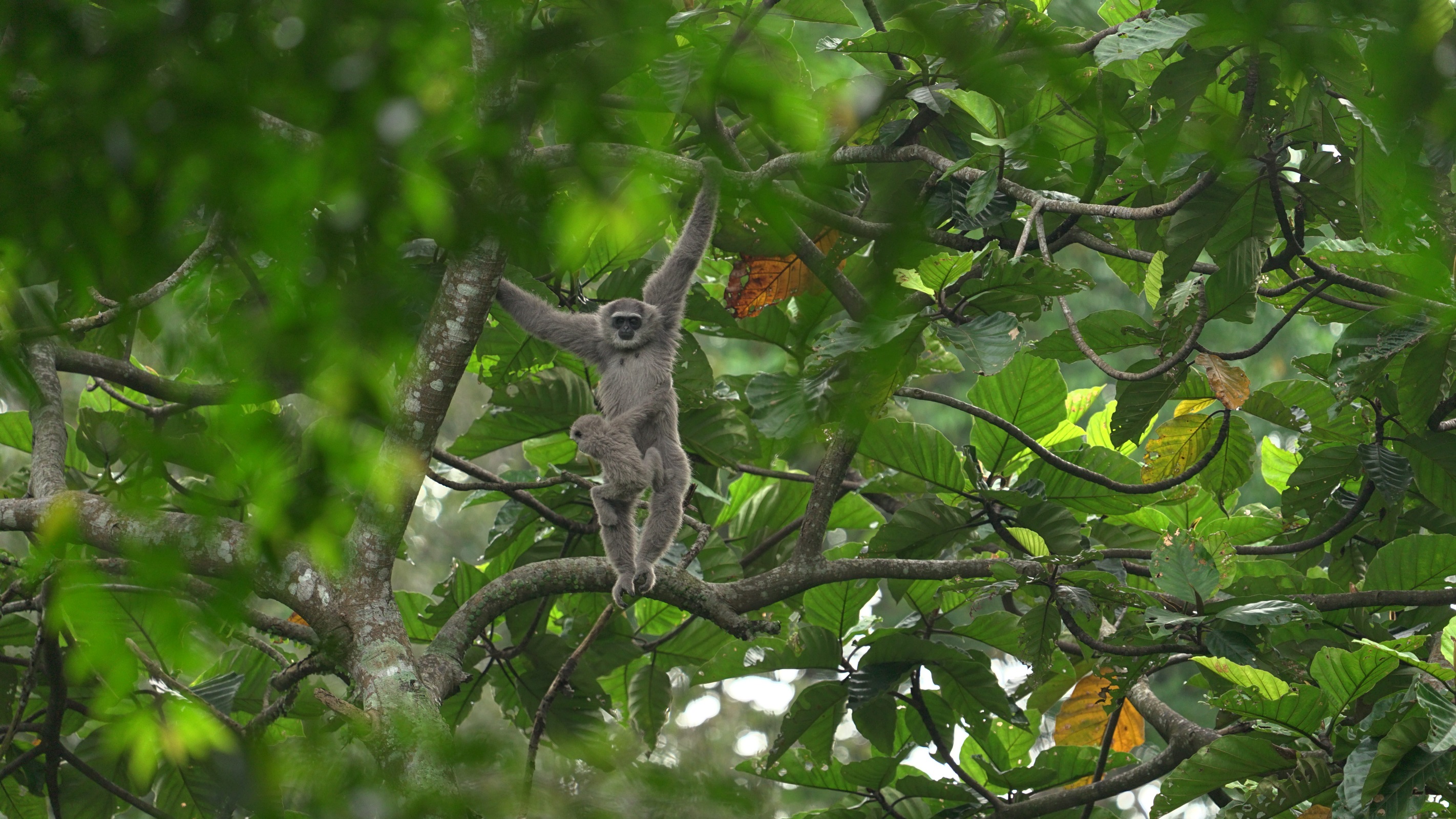Mandai Wildlife Group supports Indonesia’s Coffee and Primate Conservation Project to protect wildlife and empower local communities through shade-grown coffee.
Mandai Wildlife Group strongly believes in the concept of "One Health" – that the health of humans, animals and the environment are linked and dependent on one another. The Group’s support for the Coffee and Primate Conservation Project (CPCP), through its conservation arm Mandai Nature, showcases its longstanding commitment to its vision of sustainable populations of wildlife and human communities thriving in functioning ecosystems. Based in Java, Indonesia, the CPCP programme is set up by SwaraOwa, a non‐governmental organisation that focuses on conservation work for Indonesian primates. Mandai Wildlife Group and Mandai Nature are amongst other conservation organisations that provide funding to the project.
Fewer than 4,500 Javan gibbons are estimated to remain in Java, ranging from West Java to the Dieng Mountains in Central Java. Initially, the Group surveyed the eastern‐most population of this species to understand its conservation needs there. However, when its project partner identified habitat loss caused by coffee plantations as a threat to the species, the Group expanded its scope of support. The project team worked with villagers to promote wildlife‐friendly coffee as the norm in the landscape.
The Group’s support for CPCP facilitated the creation of Owa coffee, growing two types of beans, Robusta and Arabica, under the canopies of the natural rainforest and, in some cases, as part of other agroforestry plantations. More importantly, due to the engagement and increased understanding of the landscape, the farmers in the area now advocate for the conservation of forest habitats and the protection of the Javan gibbon. By involving villagers in their field‐based conservation efforts and ensuring that coffee is sustainably harvested, CPCP has shown them that doing good can provide a reliable source of income while fostering conservation support for the gibbons.
![images_lshfa_image_1[1].jpg](/images/digitalhublibraries/articles-categories/810c24dd-7219-49d9-83b3-dde2799456ba.jpg?sfvrsn=ab9d2c48_2)
A silvery baby gibbon with an adult. Photo credit: SwaraOra
Coffee cultivation typically requires land clearing, intensifying the threats faced by the forest inhabitants. Growing shade coffee instead of clearing the forest for other coffee cultivation helps protect gibbons and other animals that inhabit the area. Shade‐grown coffee is a crop produced from coffee plants grown under trees.
Protecting the rainforest also creates a wildlife corridor for animals to roam across the coffee‐growing areas and eventually encourages more animals to return to the area and repopulate. Therefore, a key part of the project looks at protecting the endangered Javan gibbon around the Dieng Mountain in Central Java with a novel method – by engaging villagers to grow shade coffee under the forest canopy.
Owa Coffee
The Group’s support for CPCP facilitated the creation of Owa coffee, growing two types of beans, Robusta and Arabica, under the canopies of the natural rainforest and, in some cases, as part of other agroforestry plantations. More importantly, due to the engagement and increased understanding of the landscape, the farmers in the area now advocate for the conservation of forest habitats and the protection of the Javan gibbon. By involving villagers in their field‐based conservation efforts and ensuring that coffee is sustainably harvested, CPCP has shown them that doing good can provide a reliable source of income while fostering conservation support for the gibbons.
![images_1ub5u_image_2[1].jpg](/images/digitalhublibraries/articles-categories/48bb40eb-a756-48ec-a7a2-de395d2d2286.jpg?sfvrsn=d9a7658a_2)
Local villager roasting the Owa coffee. Photo credit: SwaraOwa
The success of Owa coffee has helped initiate discussions amongst other villages on sustainable coffee and other agro‐forest friendly farming projects, such as honey and palm sugar. CPCP then spearheaded these projects and continued to grow with the local communities. This included the development of the stingless honey beekeeping project in Sokokembang and Mendolo, which produced about 30 to 35 kg of honey ready for sale at local markets and online marketplaces.
The Group has helped CPCP share the techniques on how shade coffee can be harvested and processed in an efficient and economically viable manner with villagers in the Pekalongan regency. The Group’s support has also enabled the first‐ever collaborative forum to be held in Petungkriyono forest where stakeholders were invited to the field to plant 1,300 trees in Tlogohendro village.
Between March 2019 and March 2022, the Group's support of CPCP enabled a variety of initiatives. Their impact included the enhancement of forest protection Petungkriyono forest by providing legal recognition as an Essential Ecosystem Area (EEA) status and enabling periodic biodiversity surveys in the Petungkriyono forest. The latter resulted in new records of rare wildlife species for this location, such as Yellow‐throated marten (Martes flavigula), Javan ferret badger (Melogale orientalis), Muntjak deer (Muntiacus muntjak), Chestnut-bellied partridge (Arborophila javanica), Javan slow loris (Nycticebus javanicus). These community actions helped instil local pride amongst villagers and motivated further protection.
The Sokokembang forest become a research site for local students in Central Java and contributed to building their academic capacity and training.
In Java, community development activities continued through improvements to palm sugar processing and training for nine women from Sokokembang and Mendolo villages and distribution of 1,500 tree seedlings in the Petungkriyono district to replant degraded areas in the community tourist sites. The Group's support also ensured a steady supply of honey from Sokokembang and Mendolo. A book and documentary on beekeeping were produced for villages keen to upskill their knowledge of honey production.
A new network for sustainable honey trading was established with an NGO to manage a primate rehabilitation centre in west Java. The supply of raw honey supplemented the diet and nutrition of the slow loris at this centre.
![images_d2kec_image_3[1].jpg](/images/digitalhublibraries/articles-categories/a554deaf-c69c-41e4-8188-0cda9d1547ca.jpg?sfvrsn=14c7c10e_2)
Local community undergoing beekeeping training. Photo credit: SwaraOwa
To further support these efforts, the Group has purchased Owa coffee to serve in its wildlife parks since 2017 and uses around 500 kg of Owa coffee beans per year. To date, the Group is the only long-term, regular international consumer of Owa coffee, with the remaining consumption within Indonesia and small exports to other international conservation organisations. Proceeds from the sales translate into higher income for the farmers, which goes into buying new equipment such as hulling and pulping machines. At the same time, as operators of four wildlife parks in Singapore, the Group could educate the millions of guests that walk through its doors and raise awareness of human impact on planet Earth and the value of making positive changes by making better choices in our daily living.

Mandai Wildlife Group’s purpose is to protect wildlife and wild places through conservation action, science, partnerships and education while inspiring people to appreciate wildlife. The Group is dedicated to caring for the planet and protecting animals and nature. It is committed to the vision of sustainable populations of wildlife and human communities thriving in functioning ecosystems.
Mandai Wildlife Group is also the steward of Mandai Wildlife Reserve, a wildlife and nature destination in Singapore that is home to world‐renowned wildlife parks, including Singapore Zoo, River Wonders and Night Safari. The Group contributes to wildlife research and actively supports conservation efforts to safeguard wildlife and their habitats.














